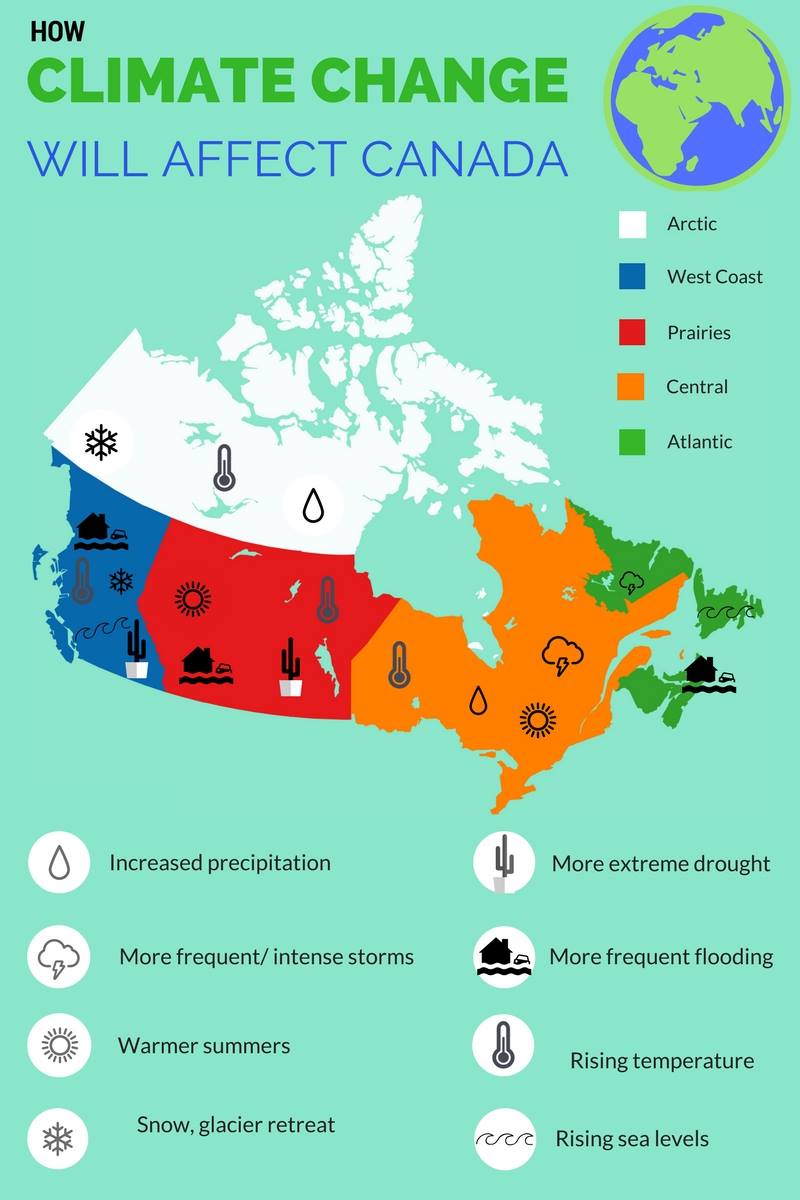Under the weather
The health implications of climate change will be felt across Canada, experts say
By Hannah McElderry
A freak storm rips down trees and injures people with flying debris; an increase of insect borne illnesses that plagues hikers in a popular wilderness area; an uptick in rates of depression and post traumatic stress disorder in a community where homes have been lost to epic flooding.
All three are plausible scenarios that place human health – either immediate or long term – at significant risk. And while they may occur at different times in widely separated parts of the country, they are linked by one thing: climate change.
After decades of the same dialogue about climate change, doctors and scientists are hoping raising an awareness of the personal health implications will heat up the conversation. Physicians and scientists have proven a direct correlation between health issues of the general population and climate change.
The doctors of the Medical Society Consortium on Climate and Health, or MSCCH, in the U.S. were hoping to bring the issue closer to home when they published a report entitled “Medical Alert! Climate Change is Harming Our Health.”
The MSCCH is a group of eight different medical organizations, representing approximately 400,000 doctors across the country.
“We were trying to send the message that physicians throughout the country are very concerned,” says the MSCCH Director, family physician Mona Saferty. “We’re already having negative impacts and we’re facing a much bigger risk.”
The science
This is not only a problem affecting the U.S. In 2015, the Public Health Agency of Canada, or PHAC, released a public health factsheet on climate change. It defined climate change as “any significant long term change in current normal conditions, such as temperature, precipitation, extreme weather events, snow cover and sea level rise.” These environmental effects are predicted to cause generally warmer temperatures as well as more frequent, and potentially more severe weather events. Across Canada, the effects are varied.
“We are seeing the effects of climate change right across the country,” says Gideon Forman, climate policy analyst with The David Suzuki Foundation. “It’s going to affect different parts of the country in different ways, but I don’t think there’s any part of the country that’s not experiencing, and will continue to experience, climate change.”

According to PHAC, these are how the different regions of Canada will be affected:
Arctic
- Dramatically higher temperatures
- Increased precipitation
- Loss of permafrost and sea ice
West Coast
- Higher temperatures
- Sea level rise, coastal flooding
- Increased snow, glacier retreat
- More severe spring floods
- More frequent and intense summer drought
Prairies
- Hotter and drier weather conditions
- Increased severity and length of droughts
- Greater frequency of flooding
- Warmer winters
Quebec and Ontario
- Hotter summers
- Warmer winters with less snow
- More storms and heavy rain events
Atlantic
- Rising sea-level
- Greater risk of flooding
- Coastal erosion
- More intense storms
The three key areas of health impacts
In today’s conversation around climate change, the most noticeable effects have been the increase of extreme weather events and general overall warmer temperatures. It may not be clear these have a direct correlation to our health, but they do.
Over the past few years, science and the public health sector have published reports showing that there have been evidence of direct health impacts, such as asthma, Lyme disease and waterborne diseases.
The MSCCH report highlighted six key concerns that affect our health: poor air quality, extreme weather events, extreme temperatures, tick and mosquito borne illness, water and food related infection and mental and social stress.
These are similar to the main concerns that have been raised by Canadian medical health practitioners.
In 2015, retired physician Don Spady and his two colleagues, retired Prof. Colin Soskolne and Prof. Trevor Hancock, published a report entitled Working Group on the Ecological Determinants of Health. The full report, which was over 350 pages long, was published to support the CPHA climate change discussion document.
The preface discusses the previous challenges faced by the public health sector. It reinforces the relationship between humans and the environment.
“Our actions can lead to great harm to the health of millions of people living today and to future generations. As well, our actions have grievously harmed, and continue to harm, the other species with whom we share planet Earth. To avoid these harms, or to minimize their impact, we must re‐ establish the reverence and awe for nature we currently ignore, and we must act in accordance with and not in opposition to nature,” says the report.
The report defines ecological determinants of health as “Earth’s life support systems,” and notes that any shift in them can have a drastic impact on human health.
The health impacts from the events of climate change are many, and are varied between geographic areas in Canada and the U.S.
However, discussion with physicians in Canada, and comparison the MSCCH report and PHAC documents, highlighted three as the most noticeable across the board. These were: air quality, extreme weather events and tick and mosquito borne illnesses. Each of these three have multiple rippling effects, and cause underlying social and mental stress.
Air quality
Poor air quality, according to the PHAC report is already an issue in Canada. Some of the health issues it can cause are: heart disease, respiratory disease and allergies.
Across the globe, WHO estimates that approximately 8.2 million people die a year from noncommunicable diseases mostly related to air pollution.
However, the issue of air quality does not just pertain to smog from pollution or second-hand cigarette smoke. An increased number of forest fires can also affect air quality.
The MSHCC report says poor air quality can increase the number of allergy and asthma attacks because of the increased amount of pollen production and other particles in the air.
According to Statistics Canada, there were almost 2.5 million cases of asthma in 2014, and the number of childhood asthma cases continues to rise.
Dr. Irene Buka, an environmental pediatrician and director of the Children’s Environmental Health Clinic at the University of Alberta, urges canadians to keep an eye on the Air Quality Health Index.
The index is defined on its website as, “a health protection tool that is designed to help you make decisions to protect your health by limiting short-term exposure to air pollution and adjusting your activity levels during increased levels of air pollution. It also provides advice on how you can improve the quality of the air you breathe.”
Extreme weather events
Over the past few years we have seen the effects of extreme weather events impacting both the U.S. and Canada. Although no one event can be attributed to climate change directly, the kinds of extreme weather events that would be expected to occur more often in a warming world, such as intense precipitation, drought and extreme heat, are indeed increasing say Climate Communication, a non-profit organization in the U.S.
The trauma experienced from these events can be a major health concern, says Professor Stefania Maggi, especially for children. Maggi is an interdisciplinary psychology associate professor at Carleton University. She believes if the proper infrastructure is not in place when an event takes place, it can leave a negative lasting impact.
“When the event is taking place and you have been exposed to trauma, what do you have that supports you going through that phase, as a child and as a community?” she says. An ineffective plan “can lead to more isolation, more despair versus mores sense of purpose and feeling support, and so on,” says Maggi. She reinforces the importance of proper infrastructure to ensure this.
Buka says the most important thing is to be aware of emergency preparedness. Each family should have an emergency plan, an evacuation plan, and an emergency supply kit.

An example of items in an emergency kit. Photo provided by Craig Moore via Flickr.
Tick and mosquito borne illnesses
The warmer weather, as shown below, means an increased the number of mosquito-borne illnesses in both Canada and the U.S. A study done by the PHAC showed there were 100 cases of West Nile Virus reported in 2016 within the five-month study period. This number is up from 78 reported cases in 2015.
Lyme disease, a tick-borne illness, is also on the rise. This is due to a number of factors, including warmer weather, say PHAC health officials. In 2009, 144 cases of Lyme disease were reported in Canada. This number jumped to 917 reported cases in 2015.

Health practitioners’ biggest concerns
Spady says one of his biggest concerns for the conversation is denialism about climate change. “It’s a real mindset issue,” he says. “Because it’s such a big problem, and yet it’s the kind of problem that people don’t want to face, because to face it in any sort of constructive manner often means recognizing that you should probably change the way you live.”
He hopes raising awareness about the direct health effects will bring the conversation to the forefront.
Recognizing the personal health consequences of climate change can help with this discussion says Forman, and that it’s important to discuss issues with direct consequences to the audience.
Maggi and Spady agree there is a need to increase awareness and education around the health impact of climate change, and the discussion of the environment in general.
What the public can do
Forman says although The David Suzuki Foundation is concerned with the impacts being seen right now, they recognize that the Canadian government is making efforts to be more environmentally-friendly, which will improve overall health in the long run. These actions include: investing in public transit, the stopping of coal burning in 2014 and the carbon pricing that is going on across the country. The foundation itself is working at the grassroots level to try and implement more eco-friendly options around cities across the country, such as bike lanes and windmills as renewable energy sources. On their website the foundation has a list of 15 ways citizens can reduce their carbon footprint.
“I think our view is best characterized by saying I think the situation is serious, but not hopeless,” Forman says. “There’s some very serious news out there and we certainly can’t ignore the situation but it’s not all doom and gloom. There are some quite hopeful things that we’ve seen.”
